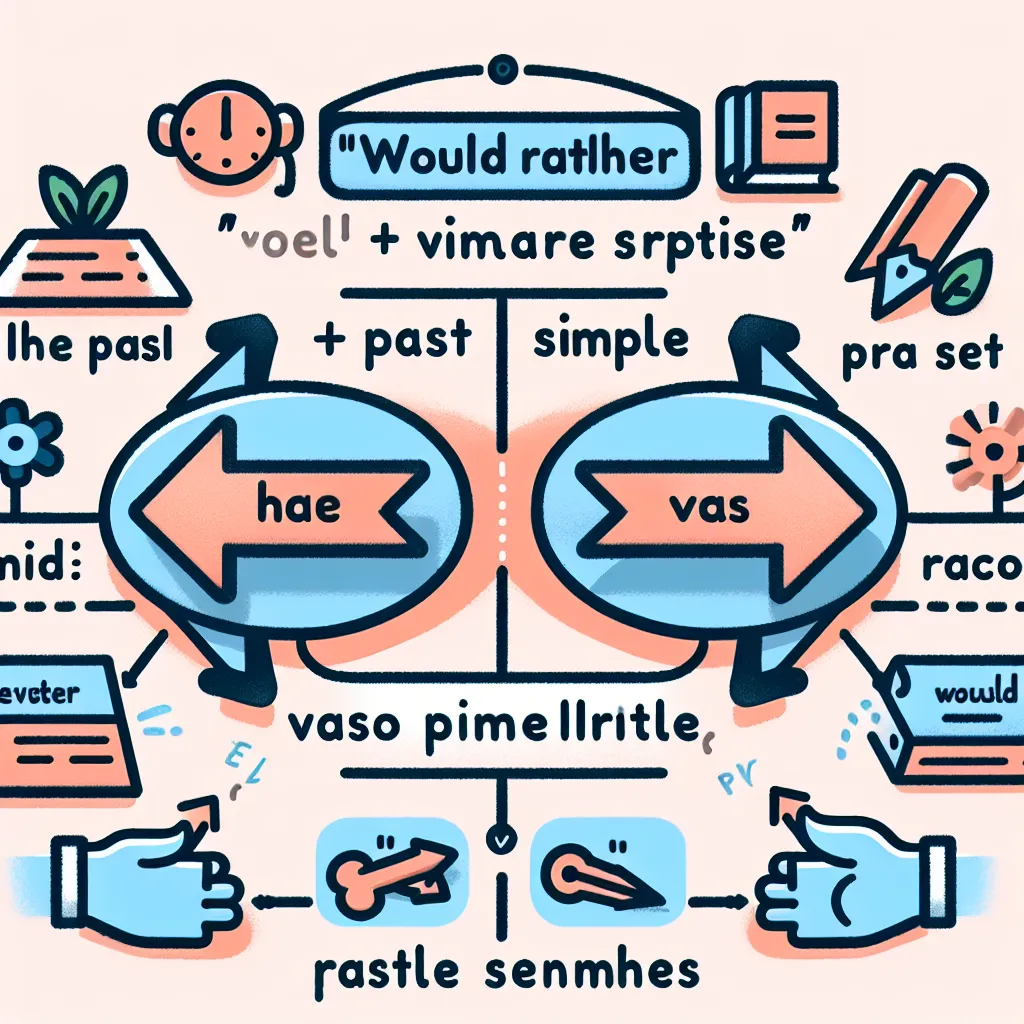The “would rather” + past simple structure is a crucial grammatical pattern that frequently appears in IELTS exams. Understanding and using this construction correctly can significantly enhance your language proficiency and boost your IELTS score. Let’s delve into the intricacies of this structure and explore how to apply it effectively in various IELTS contexts.
Understanding the “Would Rather” + Past Simple Structure
The “would rather” + past simple construction is used to express preference for a hypothetical situation in the present or future. It’s often contrasted with another less desirable option. This structure is particularly useful in IELTS Speaking and Writing tasks where you need to express preferences or make comparisons.
Examples:
- “I would rather stayed at home than went to the party.”
- “She would rather took the train than drove to work.”
- “They would rather studied abroad than attended a local university.”
In each of these examples, the speaker is expressing a preference for one action over another, using the past simple form of the verb after “would rather.”

The Significance of “Would Rather” in IELTS
The “would rather” structure is particularly valuable in IELTS for several reasons:
- It demonstrates a higher level of language proficiency.
- It allows for nuanced expression of preferences and hypothetical situations.
- It’s useful for comparing and contrasting ideas, a common task in IELTS Writing and Speaking.
Formula and Grammar Points
The basic formula for this structure is:
Subject + would rather + past simple verb (action 1) + than + past simple verb (action 2)
It’s crucial to note that despite using the past simple form, this structure refers to present or future hypothetical situations, not past events.
Applying “Would Rather” in IELTS Writing
In IELTS Writing, using “would rather” can elevate your essay’s sophistication. Here’s an example of how you might incorporate it into a Task 2 essay:
Topic: Some people believe that teenagers should focus on academic subjects at school, while others think they should study a wider range of subjects. Discuss both views and give your opinion.
Sample paragraph:
“While a broad education has its merits, I would rather schools focused on core academic subjects than attempted to cover a wide range of topics superficially. By concentrating on fundamental disciplines like mathematics, sciences, and languages, students can develop a solid foundation for future learning and career development.”
In this example, the “would rather” structure is used to express a preference for one educational approach over another, demonstrating a sophisticated grasp of English grammar.
Utilizing “Would Rather” in IELTS Speaking
In the Speaking test, using “would rather” can help you express preferences more eloquently. Consider this example for Part 2, where you might be asked to describe a place you’d like to visit:
“If given the choice between a bustling city break and a relaxing beach holiday, I would rather visited a tranquil coastal destination than explored a hectic urban environment. I find that I would rather spent my time unwinding by the sea than rushed around sightseeing in a crowded city.”
This response showcases the ability to use the structure multiple times, comparing different options and expressing clear preferences.
Advanced Usage for Higher Band Scores
To aim for higher band scores (7+), consider using more complex variations of the “would rather” structure:
- With modal perfects: “I would rather have stayed at home than have gone to the party.”
- In reported speech: “She said she would rather I went with her than stayed behind.”
- With continuous forms: “I would rather be working from home than commuting to the office every day.”
These variations demonstrate a more nuanced understanding of English grammar, which is crucial for achieving higher scores in IELTS.
Common Errors to Avoid
When using “would rather,” IELTS candidates often make these mistakes:
-
Using the infinitive instead of past simple: “I would rather to go than to stay” (Incorrect)
Correct: “I would rather went than stayed” -
Mixing tenses: “I would rather went yesterday than go today” (Incorrect)
Correct: “I would rather have gone yesterday than go today” -
Forgetting “than”: “I would rather stay home as go out” (Incorrect)
Correct: “I would rather stayed home than went out” -
Using present tense: “I would rather stay home” (Incorrect when comparing two options)
Correct: “I would rather stayed home than went out” -
Incorrect subject agreement: “He would rather I went with him” (Incorrect)
Correct: “He would rather I went with him”
Understanding these common errors and avoiding them will significantly improve your accuracy in using this structure.
Conclusion
Mastering the “would rather” + past simple structure is a valuable skill for IELTS success. It allows you to express preferences and hypothetical situations with precision and sophistication. Remember to practice using this structure in various contexts, from comparing career choices to discussing travel preferences. By incorporating it effectively into your IELTS responses, you’ll demonstrate a high level of grammatical control and language proficiency, potentially boosting your overall score.
To further enhance your skills, try creating sentences using “would rather” for different scenarios you might encounter in the IELTS test, such as describing ideal living conditions, discussing educational choices, or explaining personal preferences in work environments.